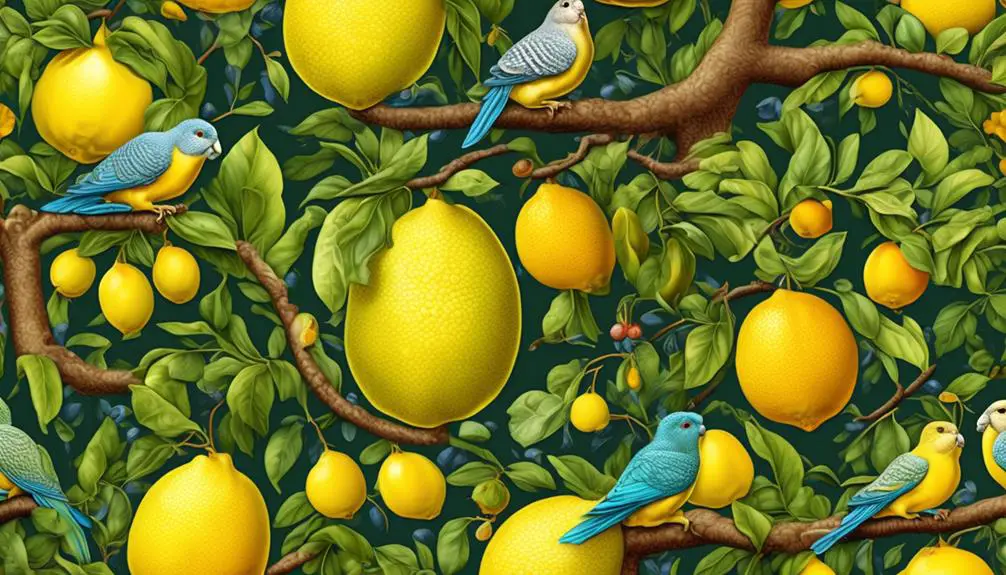Have you ever wondered about the secret lives of animals and their culinary choices? Just like humans, animals have unique tastes and preferences when it comes to food.
While some creatures may be as cautious as a mouse, others are as bold as a lion when it comes to trying new flavors. Lemons, with their tangy and refreshing taste, are no exception.
You might be surprised to learn that there are certain animals out there who have developed a liking for this citrus fruit. So, who are these lemon enthusiasts and what draws them to this zesty treat?
Stay tuned as we uncover the intriguing world of animals and their love affair with lemons.
Butterflies and Lemons

Butterflies are irresistibly drawn to the citrusy aroma of lemons, making them a delightful presence in lemon gardens. These delicate creatures are attracted to the scent of lemons due to their keen sense of smell. While butterflies don’t harm ripe lemons, their proboscis isn’t strong enough to penetrate the skin. Instead, they enjoy sitting on lemon peels and sucking the remaining juices. To attract butterflies to your garden, you can save fresh lemon peels in a shallow dish with water, creating a fragrant oasis for these beautiful insects. Lemon juice also serves as a magnet for butterflies, enticing them with its tangy sweetness.
When it comes to the interaction between butterflies and lemons, it’s important to note that butterflies play a beneficial role in the ecosystem by pollinating flowers, including those of lemon trees. As they visit lemon gardens, they transfer pollen from one flower to another, aiding in the fertilization process. This, in turn, contributes to the growth and development of lemons.
Cockatoos and Lemons
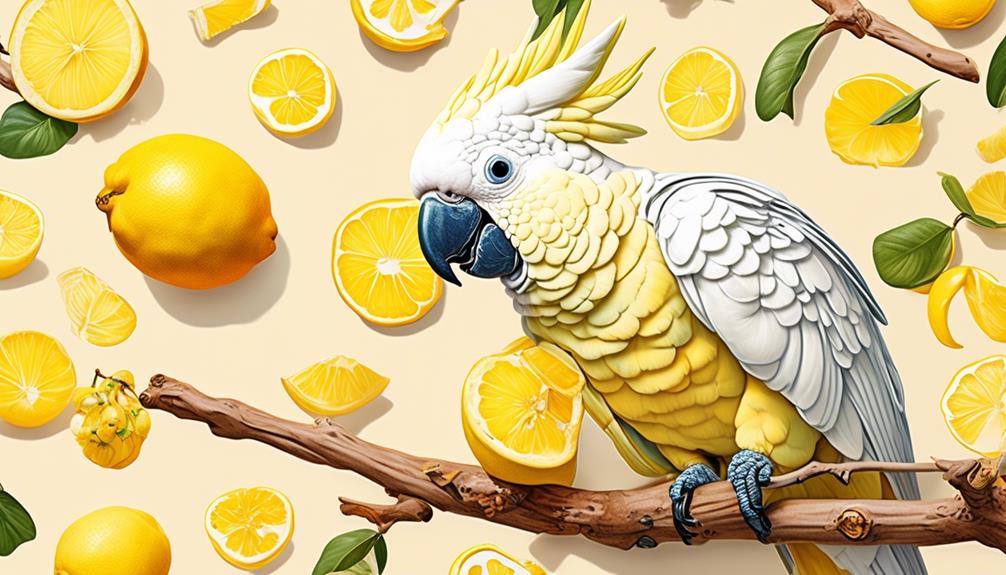
Cockatoos are notorious for their attraction to lemons and their tendency to cause damage to lemon farms. These birds have a keen sense of smell that allows them to detect the appealing aroma of lemons, especially if they’re mildly sweet. Once cockatoos spot a lemon tree, they’re relentless in their pursuit of the fruit, causing significant harm to the crops.
Farmers often resort to using nettings to protect their lemon harvests from these feathery intruders. However, cockatoos don’t discriminate between sweet and sour lemons, attacking all the fruits within their reach. This indiscriminate behavior can lead to substantial losses for lemon farmers.
It is essential to take precautions to safeguard lemon farms from cockatoos. By implementing effective bird deterrent strategies, such as visual deterrents, noise devices, or even employing trained birds of prey, farmers can help minimize the damage caused by these persistent birds.
Understanding the attraction that cockatoos have to lemons is crucial in developing effective methods for deterring them from lemon farms. By addressing this issue, farmers can protect their valuable crops and ensure a successful lemon harvest.
Goats and Lemons
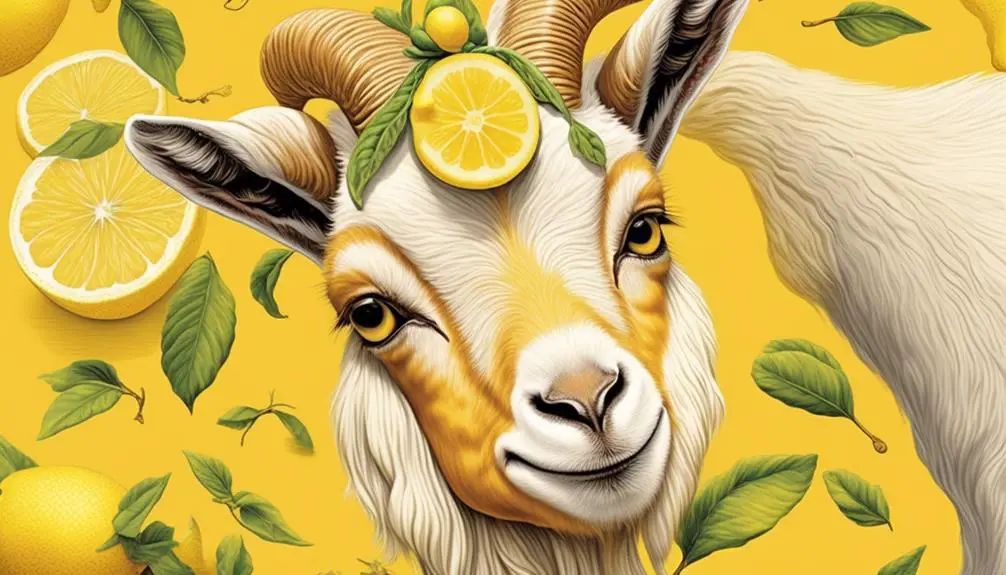
Goats, like humans, require vitamin C in their diet. Lemon peels provide goats with a good source of this essential nutrient.
However, it’s important to offer lemons to goats in moderation to avoid digestive distress, as lemons aren’t a natural part of their diet and too much acidity can harm their digestive system.
Goats and Vitamin C
In regards to goats and their dietary needs, it’s important to consider the role of Vitamin C, and specifically how lemons can contribute to their overall health.
While lemons aren’t a natural part of a goat’s diet, they can still be beneficial when offered in moderation. Lemon peels provide goats with Vitamin C, an essential nutrient that plays a key role in their immune system function.
However, it’s crucial to avoid excessive consumption of lemons, as the high acidity can harm a goat’s digestive system. Therefore, it’s recommended to include lemon rinds sparingly in their diet to avoid any potential digestive distress.
Moderation for Digestive Health
To maintain optimal digestive health in goats when incorporating lemons into their diet, it’s important to practice moderation. While goats enjoy eating lemon peels and the rinds are sometimes included in their diet, it’s crucial to offer lemons in limited quantities to avoid digestive distress. Lemons aren’t a natural part of a goat’s diet, and consuming too much acidity can harm their digestive system.
However, it’s worth noting that lemon peels provide goats with a good source of Vitamin C. Therefore, when feeding goats lemons, it’s recommended to offer them in moderation, as excessive consumption may lead to gastrointestinal issues. By practicing moderation, you can ensure that your goats can enjoy the benefits of lemons without compromising their digestive health.
Chickens and Lemons
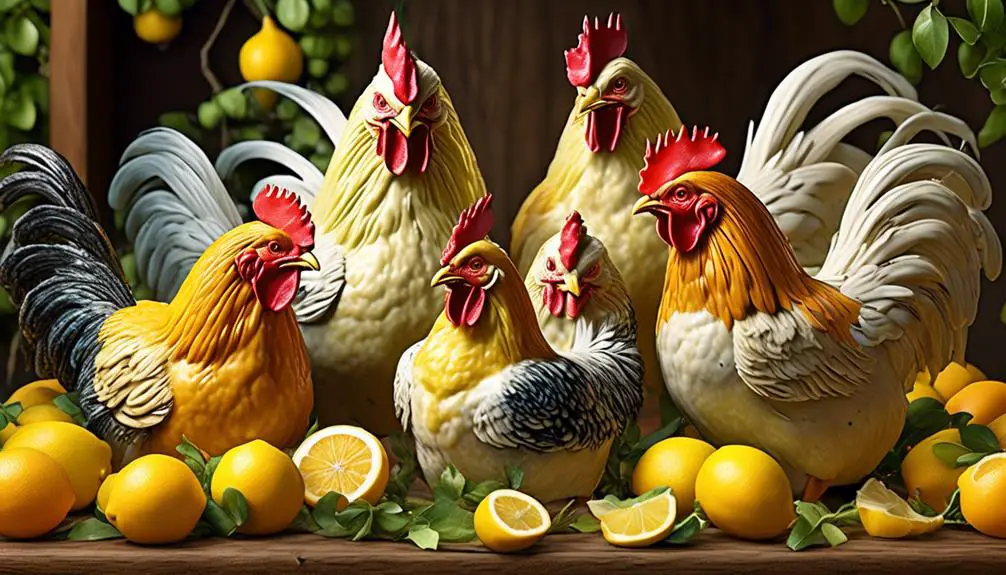
Chickens can benefit from consuming lemons as they provide health benefits and improve the quality of eggs.
Lemons are rich in Vitamin C and antioxidants, which help build a strong immune system in chickens.
Chickens enjoy eating lemons as snacks and pecking on the flesh, making them a beneficial addition to their diet.
Health Benefits for Chickens
The inclusion of lemons in a chicken’s diet provides numerous health benefits, enhancing the overall well-being and productivity of these feathered friends.
Lemons are a rich source of vitamin C and antioxidants, which are essential for building a strong immune system in chickens. These nutrients help protect chickens from diseases and infections, improving their overall health.
Additionally, the acidity in lemons aids in the digestion of food, ensuring that chickens absorb vital nutrients effectively. Lemons also contribute to the quality of eggs produced by chickens. The nutrients found in lemons can enhance the nutritional content of eggs, making them more nutritious for human consumption.
Chickens enjoy pecking on the flesh of lemons, making it an enjoyable snack for them as well. Including lemons in a chicken’s diet can be highly beneficial for chicken owners, leading to healthier and more productive flocks.
Improved Egg Quality
After discussing the health benefits of lemons for chickens, it’s important to explore how incorporating lemons into their diet can lead to improved egg quality.
Lemons are a rich source of Vitamin C and antioxidants, which play a crucial role in maintaining a strong immune system in chickens. By including lemons in their diet, chickens can build up their immune defenses, resulting in healthier hens and better quality eggs.
The antioxidants in lemons also help in reducing oxidative stress in chickens, promoting overall reproductive health.
Additionally, the natural acidity of lemons can aid in calcium absorption, contributing to stronger eggshells. When chickens consume lemons, they not only enjoy them as a tasty snack but also benefit from the nutritional properties that can enhance their egg-laying capabilities.
Lemon as a Snack
Lemons can serve as a nutritious and enticing snack for chickens, offering them a range of health benefits and enriching their diet. Chickens enjoy eating lemons as snacks and pecking on the flesh. The vitamin C and antioxidants present in lemons help build a strong immune system in chickens, leading to improved overall health. Including lemons in a chicken’s diet can also have a positive impact on the quality of eggs produced. The nutritional value of lemons can be summarized in the following table:
| Nutrient | Amount per 100g |
|---|---|
| Vitamin C | 53 mg |
| Potassium | 138 mg |
| Calcium | 26 mg |
Offering lemons as a snack can be beneficial for chicken owners looking to enhance the well-being of their flock. It is important to remember that lemons should be given in moderation to avoid any digestive distress.
Woodpeckers and Lemons
Woodpeckers, although not commonly observed consuming lemons in the wild, occasionally peck at these citrus fruits to extract essential oils for the health of their feathers. While woodpeckers aren’t known to be regular consumers of lemons, they’ve been observed pecking at them to release the oils present in the fruit. These essential oils serve as a natural treatment for their feathers, helping to keep them healthy and well-maintained.
In the wild, woodpeckers primarily rely on a diet of insects, tree sap, and nuts. However, in captivity, woodpeckers are sometimes provided with peeled lemons in sparing quantities to supplement their diet with additional vitamin C. This vitamin is essential for their overall health and well-being.
It is important to note that woodpeckers generally avoid lemons due to the bitter outer skin. Therefore, any damage observed on lemons on trees is unlikely to be caused by woodpeckers. However, in certain circumstances where lemons are readily available and other food sources are scarce, woodpeckers may resort to pecking at these fruits for their nutritional benefits.
Attracting Butterflies to Your Garden

To attract butterflies to your garden, implementing specific strategies and creating an environment conducive to their presence can greatly enhance the chances of these enchanting creatures gracing your outdoor space.
Butterflies are attracted to the bright colors and fragrant flowers, so planting a variety of nectar-rich plants can be effective. Some popular options include butterfly bush (Buddleja), milkweed (Asclepias), and lavender (Lavandula). These plants provide a source of food for adult butterflies and also serve as host plants for their caterpillars.
Additionally, providing a water source such as a shallow dish with wet sand or pebbles can be beneficial, as butterflies need to drink water and extract minerals from moist areas.
Creating sheltered spots in your garden, such as shrubs or tall grasses, can also provide butterflies with protection from predators and harsh weather conditions.
Finally, avoiding the use of pesticides and herbicides in your garden is crucial, as these chemicals can be harmful to butterflies and other beneficial insects.
Protecting Lemon Crops From Cockatoos
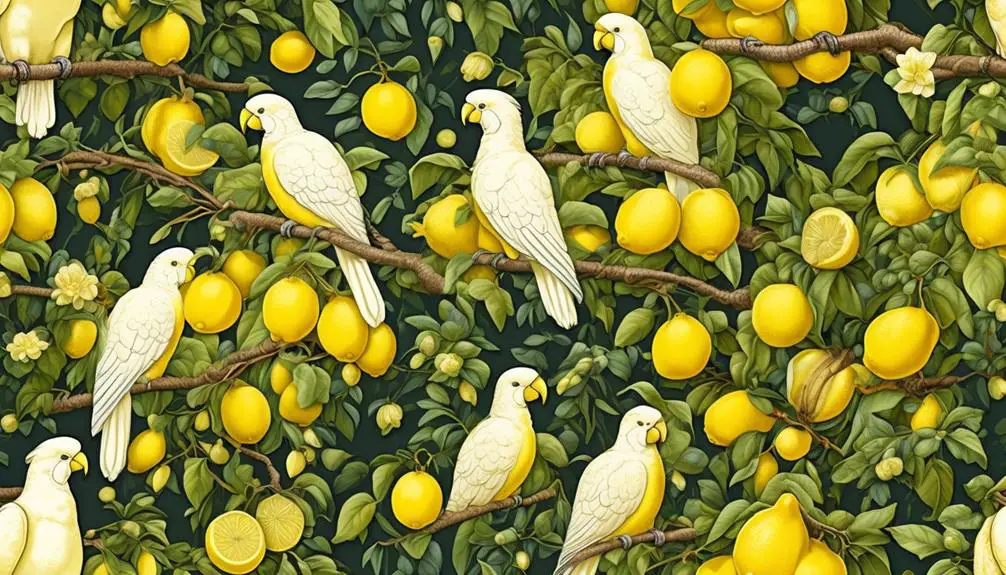
Protecting lemon crops from the destructive impact of cockatoos requires proactive measures and careful management techniques.
Cockatoos are known to attack lemon farms, particularly if the lemons are mildly sweet. These birds are attracted to the scent of lemons and can’t distinguish between sweet and sour fruits, leading them to attack all the lemons they encounter.
To safeguard lemon harvests, farmers often utilize nettings to prevent cockatoos from accessing the crops. These nettings create a physical barrier that discourages the birds from landing on the trees and causing damage.
Additionally, scare tactics such as loud noises or visual deterrents like reflective objects may also be employed to deter cockatoos from the lemon orchards.
It’s crucial for farmers to implement these protective measures to ensure the success of their lemon crops and avoid significant losses due to bird damage. By actively managing and implementing these techniques, lemon growers can effectively protect their crops from the destructive impact of cockatoos.
Including Lemons in Animal Diets
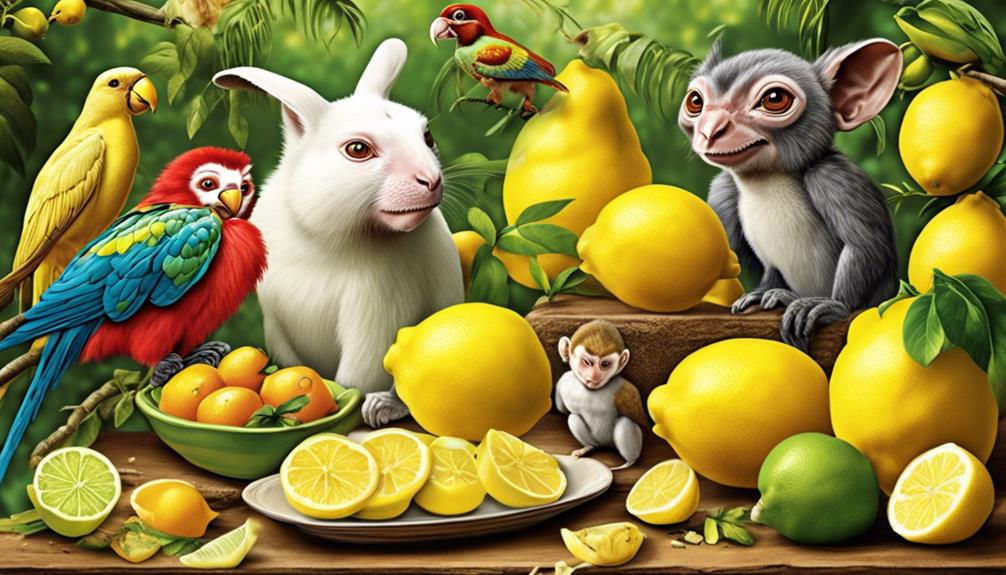
Including lemons in animal diets can provide various health benefits and nutritional value.
While lemons aren’t a natural part of their diet, some animals can benefit from their consumption in moderation. For goats, lemon peels can be included in their diet as they’re a good source of Vitamin C. However, it’s important to offer lemons in moderation to avoid digestive distress, as too much acidity can harm their digestive system.
Chickens can also benefit from lemons in their diet. The Vitamin C and antioxidants in lemons can help improve the quality of their eggs and build a strong immune system. Chickens enjoy eating lemons as snacks and pecking on the flesh.
Woodpeckers, on the other hand, don’t commonly consume lemons in the wild. While they may occasionally peck at lemons to extract essential oils for their feathers, they generally avoid them due to the bitter outer skin. Captive woodpeckers may be given peeled lemons in sparing quantities for their Vitamin C content.

Erzsebet Frey (Eli Frey) is an ecologist and online entrepreneur with a Master of Science in Ecology from the University of Belgrade. Originally from Serbia, she has lived in Sri Lanka since 2017. Eli has worked internationally in countries like Oman, Brazil, Germany, and Sri Lanka. In 2018, she expanded into SEO and blogging, completing courses from UC Davis and Edinburgh. Eli has founded multiple websites focused on biology, ecology, environmental science, sustainable and simple living, and outdoor activities. She enjoys creating nature and simple living videos on YouTube and participates in speleology, diving, and hiking.

